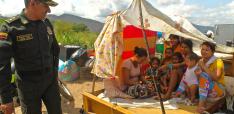How to Avoid Another Lampedusa
Mabel González Bustelo lays out policy recommendations for avoiding further unnecessary deaths of migrants looking for opportunities in the EU.
Policy Recommendations:
In order to avoid another Lampedusa, the EU should:
a) Explore channels for legal migration based on single application procedures and permits and common sets of rights. Cooperation with third countries should include ways to facilitate circular and temporary migration.
b) Ensure a fair and common asylum system including application procedures at any European Consulate in third countries and shared responsibilities among EU members.
c) Allow ship crews to undertake rescue operations without being accused or criminally charged for saving lives.
A shipwreck off the Italian island of Lampedusa, in which nearly 400 African asylum-seekers and migrants lost their lives in the first days of October, put the issue of immigration back on the political agenda. But the response of European institutions and governments once again revealed the split-personality problem that has long characterized European approaches. These are based in a double standard: we need migrant workers and have obligations towards asylum-seekers under International Law, but we do not want them here.
Hypocrisy was patent in the days following the tragedy. In the middle of a huge media uproar, high-level European and Italian authorities mourned the dead, while the survivors were treated according to current Italian Law and formally considered as criminal suspects.
The EU migration policy is plagued with problems. Firstly it is weak, and most real policies are State-level, fragmented and guided by domestic political considerations rather than by a European vision. The issue is politically sensitive and Governments fear losing control, especially in times of economic crisis and rise of populist and extreme right-wing parties and movements. Although the European Commission has at times tried to push for a unified and single approach, self-interest tends to predominate.
Secondly, policies towards migrants, refugees and asylum seekers have fallen under a securitization approach where people are not considered as human beings but part of an external ‘threat’. The responses match those assumptions. The EU has invested millions of Euros in recent years to halt unwanted immigration.
The agency FRONTEX was created in 2004 to tighten surveillance along the Mediterranean borders (making it one of the most closely monitored maritime areas in the world). Its budget has grown from 6.4 million Euros by 2006 to 84.9 million by 2012. A new and tightened surveillance scheme, EUROSUR, will enter into force next December including satellite systems, drones and high resolution cameras, and improved information exchange among member states and with FRONTEX.
The EU’s border security is also managed through agreements and cooperation with third countries, without further consideration for the methods they use to halt people (that sometimes include inhuman and degrading treatment), as denounced by Amnesty International, Mèdecins Sans Frontiéres and the Office of the High Commissioner on Human Rights (UN), among others.
The Dublin II regulation establishes that requests for asylum must be handled by the country where the person first arrives (mostly Eastern and Southern countries), and imposes heavy restrictions on further movement within the European Union.
The Bossi-Fini Law passed in Italy under the last Berlusconi Government provides powers to the Navy to block the entry of migrant boats to Italian territory by stopping them when they are in international waters. Furthermore, the law includes a criminality clause that applies to anyone who helps illegal migrants to enter the country. It even criminalizes the fishermen or crew of commercial boats who seek to help migrant vessels in dangerous situations, including prosecution and confiscation of boats. Many of them are now too afraid to help.
After Lampedusa, the EU authorities called for extra resources to launch a Mediterranean-wide ‘search and rescue’ operation, under the leadership of FRONTEX. No clarification was provided as to what to do with the people saved afterwards and no additional guarantees have been approved, as denounced by the OHCHR.
Current European approaches fail to address the real issue: why migrants and asylum seekers want to reach Europe. They flee war and violence, human rights violations, lack of freedom, poverty and inequality. Dramas and tragedies will happen again until that point is understood. Closing the borders only makes routes more dangerous and difficult, and put the life of people in the hands of organized illegal groups that raise huge profits by handling this human flow.
The situation warrants the question: Do fences, drones and militarized approaches make us safer, when at the same time they provide incentives and benefits to organized groups and make them stronger?
Europe needs a reassessment of migration and asylum policies based on an analysis and understanding of current demographic, political and economic trends, and on recognition of obligations under International Refugee Law and International Human Rights Law and standards, including the Law of the Sea where relevant.
A new holistic and balanced policy should include the opening of channels for legal migration. Both EU Home Affairs Commissioner Cecilia Malmstrom and the president of the European Parliament Martin Schulz have agreed. This would entail opening a debate about those channels that may include open and transparent procedures for nationals of third countries and the availability of information on employment-related migration opportunities. A single application procedure and a single permit for third-country nationals to reside and work in the territory of a Member State, with a common set of rights for third-country workers legally residing in a Member State (including refugees and asylum seekers and with the same level of protection as national workers) could form the basis of that policy.
There is a need for a strengthened search and rescue capacity at sea in the Mediterranean, coupled with fair treatment for shipmasters undertaking search and rescue operations (they should not be accused or confronted with criminal charges). Safe places should be established as well as reception facilities to access assistance and care.
People seeking international protection should be able to apply in their countries of origin or in a third country, in the consulate of any EU member State, to be issued a visa without need to risk their lives crossing the Mediterranean. The new asylum system should ensure equal and fair treatment in the whole EU territory, with the management of an administrative European authority and appeals guaranteed by an independent jurisdiction. The system would work under the principle of responsibility sharing and support by an EU Compensation Fund provided to member states. Full compliance with international Law and standards should be the basis of the system.
Cooperation with third countries of origin and transit should include: ways to facilitate circular and temporary migration; institution-building to better deal with migrants and asylum seekers with due respect to human rights norms; and capacity-building to deal with human smuggling networks (without criminalizing migrants).
European institutions have sometimes been criticized for their detachment from state constituencies. But with regards to migration and asylum, that distance could be the critical element needed to push for a new approach: based in a wide recognition of the actual and potential role of Europe in a changing world and firmly based in the very principles that lay at the foundation of the European Union.
That would be the most meaningful way to honor the victims of Lampedusa.
Mabel González Bustelo is a journalist, researcher and international consultant specialized in international peace and security, with a focus on non-State actors in world politics, organized violence, conflict and peacebuilding. Read more from Mabel, and others, in e-IR’s The Knotted Gun series of articles.

